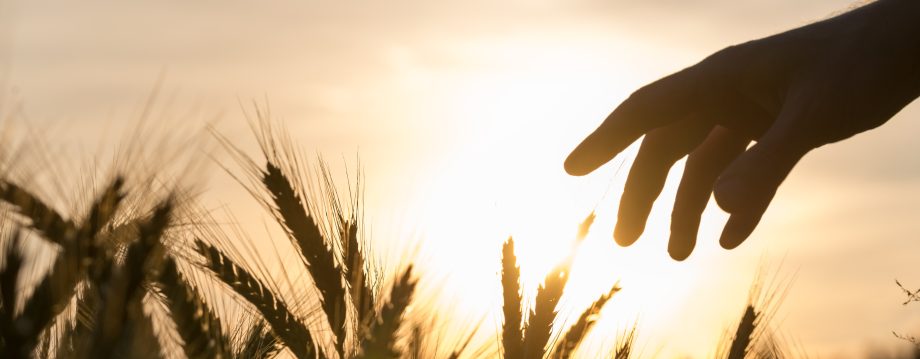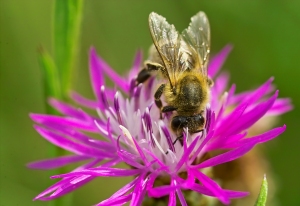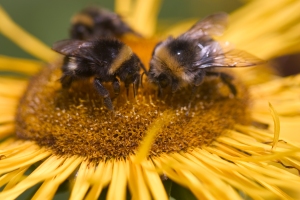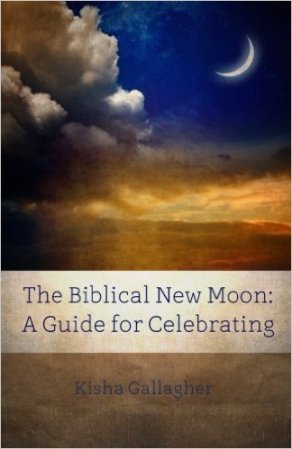The Hebrew word for bee is Devorah (Deborah). This is also the feminine form of the word davar (literally: Word). Another derivative from this Hebrew root is midbar or wilderness. Jeff Benner has this to say about our root word:
The root word is ‘davar’ and is most frequently translated as a thing or a word. The original picture painted by this word to the Hebrews is the arrangement of things to create order. Speech is an ordered arrangement of words. In the ancient Hebrew mind words are ‘things’ and are just as ‘real’ as food or other ‘things’. When a word is spoken to another it is ‘placed in the ears’ no different than when food is given to another it is ‘placed in the mouth’. The Hebrew name Devorah (Deborah) means ‘bee’ and is the feminine form of the word davar. Bees are a community of insects which live in a perfectly ordered arrangement. The word ‘midvar’ meaning wilderness is actually a place that exists as a perfectly arranged order as its ecosystem is in harmony and balance.[1]
Bees are fascinating little creatures. The structure of their colonies are perfectly ordered much like the wilderness and the Word of God. The pollination that they provide for our crops is vital to our very survival. Is it any wonder that Adonai chose the humble honey bee as a natural picture of His spiritual Torah? Both provide Life! Even more interesting is that while the bee is an unclean insect, the sticky sweet honey that they produce is not.
Perhaps that is because we are supposed to be similar to a bee. We should be building the house (colony) in unity and with order. Moreover, much of the time we are ritually unclean and/or spiritually unclean due to sin. Nevertheless, we are told to remedy our dilemma by the cleansing of the blood of the Lamb. Once we do, we can venture into the fields like the worker bees to build the Kingdom by gathering pollen from the flowers of the earth. Our efforts should produce golden sweet honey that attracts all the “whosoevers,” which is living the Word with love.
Ironically, as the world slips further away from the Creator’s Word and closer to death, the natural honey bee population is also dying.[2] This should cause us great concern because bees are directly responsible for one out of every three bites of food that you ingest![3]
“If the bee disappeared off the face of the earth, man would only have four years left to live.” ― Maurice Maeterlinck, The Life of the Bee
We need to be praying not only for our nation and the world to turn back to Adonai, but also for the survival of the honey bee. But this post isn’t about the physical bee as much as it is about the spiritual picture that they represent.
Deborah the Bee and Nurse
The Book of Judges enumerates the most well-known biblical woman with the name Deborah, but before we explore her story, there is another more obscure Deborah mentioned in the Torah that I’d like to highlight. The reference is in the middle of the passage below. Please read all five verses so you can see the beauty of the context.
Gen. 35:6-10 So Jacob came to Luz (that is, Bethel), which is in the land of Canaan, he and all the people who were with him. (7) He built an altar there, and called the place El-bethel, because there God had revealed Himself to him when he fled from his brother. (8) Now Deborah, Rebekah’s nurse, died, and she was buried below Bethel under the oak; it was named Allon-bacuth. (9) Then God appeared to Jacob again when he came from Paddan-aram, and He blessed him. (10) God said to him, “Your name is Jacob; You shall no longer be called Jacob, But Israel shall be your name.” Thus He called him Israel.
This isn’t the only reference to Deborah the nurse of Rebekah. She makes a brief appearance in Genesis 24 when Abraham’s servant finds Isaac’s wife, Rebekah, at the well. When her family sends her away to marry Issac, she doesn’t go alone. They send her nurse, Deborah, with her.
Gen. 24:59 Thus they sent away their sister Rebekah and her nurse with Abraham’s servant and his men.
Though the nurse isn’t named in this passage, most of the Christian and Jewish commentaries[4] that I referenced believe that this nurse was none other than the Deborah mentioned a little later in Genesis 35. Rashi cites a tradition that Rebekah had sent Deborah to Aram to tell Jacob that it was now safe to return.[5] I find this interesting given the name of the Torah Portion this passage is found in: Vayishlach “And He Sent” (Gen. 32:4-36:43).
Genesis 35[6] comes after Jacob wrestled all night with the “angel,” his reunion with Esau, and Dinah’s violation by Shechem. Jacob has literally gone from the “fire” to the “frying pan” and back again. Life is hard. He has made both good and bad decisions and is living the consequences. Adonai tells him to return to Bethel (House of God) and build an altar. Bethel is where YHWH first revealed Himself to Jacob. It is as if Adonai is bringing Jacob full circle.
At this point in the narrative, the story is interrupted by a blurb about the nurse named Deborah. We are not given much information about her life, but the fact that the Torah mentions her at all is very telling. Deborah was Rebekah’s nurse; Rebekah is Jacob’s mother. Apparently, Deborah had been with Jacob all these years at her request. As a nurse, Deborah would have been a nurturer to Jacob, his wives, and his children. It is doubtful that this woman was married and had children of her own. Instead, she lived a life devoted to Abraham’s seed. She was like one of the worker bees ensuring the survival of the colony. I believe that Rebekah sent her nurse to watch over Jacob and to ensure his prophetic future.
Once Adonai brings Jacob back to where their relationship began, Deborah dies.[7] The importance of her role is revealed in the place and name of where she was buried: Allon-Bacuth. She’s buried under an oak tree in the land of Bethel. The people called this place “The Oak of Weeping/Mourning.” I can only imagine that for Deborah to have a permanent mention in the Torah that she was indeed a Mighty Oak in the eyes of the family. She was no mere nurse or servant. Her name implies hard diligent service in producing the sweet honey of the WORD.
Before Jacob returnsed to Bethel, he was a little reckless and immature. A person with a nature such as this needs a counselor, a guide, a helper, and a nurturer. Though the Torah doesn’t explicitly state that Deborah embodied these things to Jacob, I believe the “hints” are undeniable. Let’s look at some of the imagery.
- Deborah = bee (busy/unity) and Word (as in Word of Elohim).
- Nurse = (yanaq) to give milk or sustenance to the immature.
- Oak = tree (etz) and counsel (etzah) trees are pictures of counsel and the righteous.
- Bethel = House of El (God).
The nurse Deborah is greatly mourned because she was a mother figure, teacher of the Word, and counselor to Jacob and his family. As a woman of valor,[8] she had been a picture of the gentle guidance of the Holy Spirit in the lives of young Israel.
When Adonai brought Jacob’s life full circle, he was more mature and ready for the stronger boundaries of the Father. After Deborah dies, Adonai “appeared” to Jacob again to reestablish the Promise and Covenant. Jacob’s sojourning had prepared him for this day. The change in his nature is marked by the change of his name. He is no longer a supplanter or heel catcher;[9] he is Israel (One who struggles/overcomes with God). As such, he no longer needed his mother’s Torah[10] (the imagery of Deborah); he was ready to walk with his Father. Nevertheless, this process is bittersweet. In this Torah Portion[11] where Deborah meets her demise, Rachel and Isaac also pass away. Thus, Jacob’s promotion comes on the heels of losing a mother figure[12], his beloved wife, and his earthly father.
Meanwhile, Back at the Hive
The heart of any beehive is its queen. The hive does not exist without her. She literally builds the colony as “a wise woman builds her house.”[13] The queen releases pheromones (an aroma) that keeps the hive thriving and humming in unison. This is like the aroma of the anointing oil, and the Holy Spirit. This sweet fragrance should also be discernible on us when we meet others. I’m not one to read many Bibles that “paraphrase” the Scriptures, but I couldn’t resist these verses:
2Co 2:14-15 I am grateful that God always makes it possible for Christ to lead us to victory. God also helps us spread the knowledge about Christ everywhere, and this knowledge is like the smell of perfume. (15) In fact, God thinks of us as a perfume that brings Christ to everyone. For people who are being saved, this perfume has a sweet smell and leads them to a better life… (CEV)
I happen to follow a blog that is all about bee keeping or apiculture. Recently, an article caught my attention, but for far different reasons than the author intended. The name of the post is Roar of a Queenless Hive.[14] The bee keeper had inadvertently removed a panel from one of his hives that had a queen on it. After a few minutes, the hive began to roar with chaos and loud buzzing. He knew that he must have mistakenly removed the queen which sent the hive into a panic. His point was to warn fellow bee keepers of making the same mistake and to “listen” as well as “look” at their hives. But it was his words that really struck me with a startling revelation.
A queenless hive will most certainly roar in a way that you rarely hear otherwise.[15]
I could not help but wonder if this natural picture of bees is also true for the body of Messiah. Like the humble bee, we should be an example of the (Living) Word. The Word produces sweet honey, not bitterness or condemnation in our lives. But there seems to be something amiss from our hives. Have we been trying to build a colony without a queen?
In Judaism, the Sabbath and the Divine Presence (Shekinah) are likened to a queen or a woman. (This is also true of the Holy Spirit and Wisdom.) If physical women are to reflect these aspects of the Creator and we are limiting, restricting, or suppressing this reflection, are we not also in effect quenching the role and work of the Holy Spirit? Is this why our “hives” are often roaring with disunity and disharmony? Women are “mothers” who set boundaries to keep peace between siblings. They nurture and nurse growing babes and ensure they reach maturity.
Perhaps the Messianic movement is similar to Jacob. Adonai is turning us back full circle to where He first appeared to us at Bethel. But like Jacob, Deborah will nurse us until we fully reach the land of milk and honey. Interestingly, it is at this point that the Genesis account shifts focus from Jacob to his progeny – especially Joseph. Since Joseph prefigures the Messiah and the last days, it is reasonable to conclude that our Mashiach will return to the scene once Jacob is ready to become Israel. (A prepared Bride)
Until then, we require the “mothering” of Deborah (Holy Spirit). I suppose the real question is, “Where are we on the journey as a Body?” Are we still slaving for Laban? Are we running from Esau? Are we wrestling with the messenger (angel)? Or have we remained silent after the violation of Dinah?
Song of Songs 4:11 “Your lips, my bride, drip honey; honey and milk are under your tongue, and the fragrance of your garments is like the fragrance of Lebanon.”
More about Deborah the Judge in Part II.
Disclaimer[16]
[1] http://www.ancient-hebrew.org/27_wilderness.html
[2] http://www.ars.usda.gov/News/docs.htm?docid=15572 In a nutshell, bees are dying at an alarming rate and this has worldwide effects on our food crops. This process is called Colony Collapse Disorder.
[3] Ibid.
[4] Here is an example: Deborah had either been sent by Rebekah to take care of her daughters-in-law and grandsons, or had gone of her own accord into Jacob’s household after the death of her mistress. The mourning at her death, and the perpetuation of her memory, are proofs that she must have been a faithful and highly esteemed servant in Jacob’s house. (Keil & Delitzsch Commentary on the O.T.)
[5] See the Etz Hayim Torah and Commentary under Genesis 35:8.
[6] We are told of three deaths in this chapter of Genesis. First, the nurse Deborah, then Rachel dies in childbirth, and finally Isaac passes at a ripe old age.
[7] The mention of Deborah’s death in the Torah is extremely puzzling especially since the Torah fails to indicate how or when Rebekah herself dies. This leads many Jewish commentator’s (such as Ramban) to conclude that this was a veiled announcement of Rebekah’s death. See the Etz Hayim Torah and Commentary under Genesis 35:8.
[8] See Proverbs 31 and my post The Biblical Role of Women Part IV.
[9] These are the meanings of the name Jacob.
[10] Pr. 1:8 Hear, my son, your father’s instruction (musar) And do not forsake your mother’s teaching (Torah).
[11] Parashat Vayishlach “And He Sent”. Genesis 32:4 – 36:43.
[12] See footnote 7.
[13] Pr. 14:1 The wise woman builds her house, But the foolish tears it down with her own hands.
[14] http://organictruths.wordpress.com/2014/03/28/roar-of-a-queenless-hive/
[15] Ibid.
[16] I am NO way implying that God is a woman or that women are gods with these questions. I abhor the new age sacred feminine and goddess worship. My point is to get the reader to look into the original language and context. The Ruach HaKodesh (Holy Spirit) is always in the feminine form in Hebrew; this is true for many of the emanations of His Presence. The One (genderless) Elohim is portrayed in the Bible with both male and female attributes. This is why we are repeatedly told that it takes BOTH a man and a woman to reflect the image of YHWH. Sadly, centuries of biased Biblical interpretation and direct misogyny have clouded our view of not only women, but also of the Holy Spirit. My desire is to be a vessel of restoration. Adonai desires us to be in Unity and to walk in Fullness. We cannot do this unless we walk in complete Truth by shaking off manmade traditions and antiquated doctrines of men. However, I believe that this also requires diligence and caution. There are a myriad of ways we can distort this message of restoration as we have seen in the mystery religions from the beginning. We must carefully weigh all things. My point is to keep the baby and toss out the bath water. Nevertheless, the motivation cannot come from a place of fear, but from the One True plumb line (Torah). In our age of information, we have no excuse to not search these things out to see if they are so. To refuse is paramount to negligence, of which we one day will have to answer.







Given the fact that my name is Deborah, I was very interested in reading this post!
Thank you for sharing your thoughts and study on Deborah. I was encouraged, and challenged —
encouraged to keep on with the nuturing of my spiritual babes; challenged to seek for Father’s sweet anointing fragrance in all that I do.
I love to read your blog. You have some wonderful insights from Abba Father. I look forward to Part 2 of this study.
LikeLiked by 1 person
Thanks Deborah! I hope Part II encourages you as well. You have a very special name indeed!
LikeLike
Pingback: Deborah the Bee Part II | GRACE in TORAH
Pingback: The Biblical Role of Women Part X | GRACE in TORAH
Pingback: The Biblical Role of Women Part VII | GRACE in TORAH
So I had a vision a little over 10 years ago where I met Jesus (https://thedeepwell.blog/2016/12/17/meeting-god/). When I arrived and walked into the House of God in, how I describe, the ‘waiting room’ there were visuals of Bee’s playing on the wall before I walked down the hall to see Jesus. Wow. I was always so confused with why God would (out of all his creation) display a video of bees on the wall. Extremely specific. Now I know. He’s been leading me to judges chapter 4 and 5 a lot the past year. D’vorah means Bees in Hebrew. But I wanted to know more and I came upon your blog. So rich. I am so grateful that God had you write this. Thank you for obeying and sharing His wisdom with all of us! Shalom to you!
LikeLiked by 1 person
Isn’t God amazing? 😀I can’t wait to read your dream entry! I have a very good friend named Deborah that ministers to me. She has been such a blessing to me the past few years. She never liked the “bee” connection to her name until Abba showed her that her name and bees are directly connected to His davar/word.
The most interesting thing about her is her gift of “pollinating” the Word in others and connecting them to one another — she is truly a “busy- bee” in the Kingdom. It fascinates me to watch her work!
I’m so glad you enjoyed the article. Thank you for taking the time to comment. May Abba continue to bless you with the rubies and diamonds of His Word as you mine for Truth!
Shalom, K
LikeLiked by 1 person
Reblogged this on The Bee Hive and commented:
When I met Yeshua HaMashiach (Jesus Christ) in a vision, I saw a visual of bees pollinating flowers on the wall right before entering His presence.
LikeLiked by 1 person
A stunning article; orderly, rich, deep, sensitive to all aspects of a point for balance, captures hints, recognises mirrored meaning and delivers insight. For me, the message is: “empty yourself My dove, My love – empty yourself for the journey in becoming a fragrant incense of offering”. May our The Great Yeshua, Lion/Lamb bless you and enrich your capacity to deliver His Truth.
Toda rava!
PS – I LOVE bees and now I’m back in the countryside, I hope it is Yeshua’s will for me to have hives.
Kia Paranihi, New Zealand
LikeLiked by 2 people
Thanks Kia! I love the quote and I’m blessed it was brought to your mind after reading my article on Deborah. 😊 I hope Abba grants you those luxurious hives!
LikeLike
Pingback: New beginnings…
Dear K.
I recently had my 7th child, a little girl that we named Ziva Bee. I wanted to somehow name her after my mom, Deborah. It’s not my favorite name and it didn’t blend well with our choice of first name. So I looked up the meaning of Deborah, found out it means Bee and wondered why in the world it meant that. Then I came across your post! Thank you so much! It’s such a beautiful correlation! Then I really thought it was interesting abt the second Deborah being “fiery” since Ziva has to do with brightness and light!
LikeLiked by 1 person
P.s. We gave her this middle name because of your post, which I have shared with everyone who has asked why we gave her that name!
LikeLiked by 1 person
I love it! And, thank you for the exposure. ❤️
LikeLike
Wow! This is fascinating. I can’t wait to see what Adonai has for your fiery, bee/Word 7th daughter! 😄
LikeLike
15 years ago my study of Scripture in Hebrew and Greek words from my concordance dabar noticed dabarand Debra somehow was related to the holy of holy‘s. 15 years later I was led to put in do you be a RNDEBRA into my surprised something came up about it. Also I have always felt that the Holy Spirit is feminine and vivid dreams it’s always a woman speaking to me. I love your explanation I love your theory I believe it’s the truth and word of God and I thank you for it . I would like to say I never much like my name I wanted to be spelled out like Deborah but it was DEBRAI no longer have my name and I’m so proud of it and it is my goal to B like those women in Scripture. Sincerely
LikeLiked by 1 person
My name is Deborah.
As a child I was abused and abandoned by my mother.
Because she hated me; I hated my NAME and MYSELF.
It is Christmas Day, today, and I am alone for many reasons that only God could orchestrate .
Yesterday I finished reading Hidden Christmas by Tim Keller. While reflecting and pondering on when the angels told Joseph to name the Messiah, Jesus, I began praying that God would reveal to me my name from Him. God named Jesus. I did not consider that my name from God could possibly be Deborah or Deborah could be lovely. (although I did remember that Deborah was in the bible, I just did not remember anything about her) So I began a search and after praying the Lord sent me right here.
Many years ago I was in Africa, and I was praying with a Muslim man to receive Christ. We were in the bush where he had NO bible or TV. After we prayed together, he asked me “What is my new name”? The Holy Spirt was near.
Thank you for this beautiful clarity and peace. The Lord loved me and knew me intimately BEFORE I was in my mother’s womb. Today I feel that Deborah is the most beautiful name. I now love my name and I will begin a journey to love myself, this Christmas Day. I will pray that Holy Spirit will fill me with the love of Christ and I will be able receive this love. I was created to love and be loved.
God Bless You. Deborah
LikeLiked by 1 person
Thank you for sharing with me, Deborah! You, indeed, were given a glorious name despite your mother’s tragic actions. May the Holy One continue to heal the wounds you received as a child, so that you come to know deep within your inner man just how precious you are in His eyes, and how much you are treasured and loved by our Father and King. In the Name above all names, Yeshua (Jesus)!
LikeLike